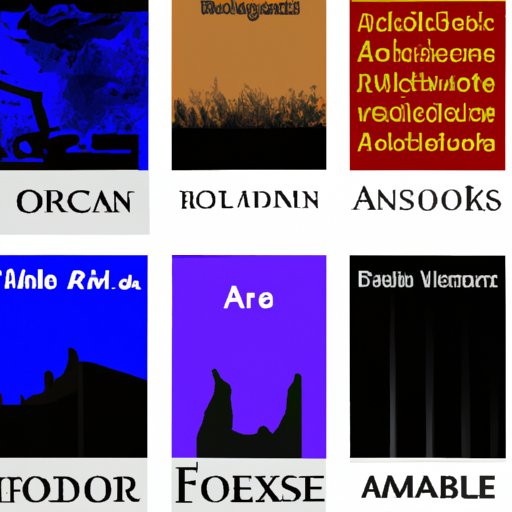Introduction
Apocalyptic literature is a genre of literature that focuses on the end of the world or a catastrophic event. It typically features characters facing an impending disaster or cataclysmic event, often with a spiritual or religious element. Apocalyptic literature can be found in many different cultures, from ancient times to the present day. In this article, we will explore the themes, popularity, and impact of apocalyptic literature, including examples from classic and modern texts.
Defining Apocalyptic Literature
Apocalyptic literature has its roots in ancient religious texts such as the Bible, which contains several apocalyptic prophecies. These texts are believed to be divinely inspired and describe a future time when God will intervene in human affairs, bringing about either destruction or salvation. Apocalyptic literature often includes descriptions of disasters, natural phenomena, or supernatural events. It typically involves characters facing an impending doom or cataclysmic event, often with a spiritual or religious element.
In more recent times, apocalyptic literature has become a popular genre of speculative fiction. It often features themes of destruction, survival, and redemption in a post-apocalyptic setting. These stories usually take place after some kind of global catastrophe, such as a nuclear war, pandemic, or environmental disaster. They often involve protagonists struggling to survive in a hostile environment, while attempting to make sense of their new reality.

Exploring the Themes of Apocalyptic Literature
The themes of apocalyptic literature often revolve around destruction, survival, and redemption. Common themes include the end of the world, humanity’s powerlessness against forces beyond its control, and hope for a better future. Other themes include the struggle between good and evil, the importance of community, and the power of faith.
Examples of these themes can be seen in classic apocalyptic texts such as the Bible’s Book of Revelation and John Milton’s Paradise Lost. In Revelation, the world is destroyed by the coming of the Four Horsemen of the Apocalypse, while in Paradise Lost, Satan leads a rebellion against God and attempts to overthrow Heaven. Both works feature characters facing destruction and despair, but also offer hope for redemption and a better future.
Examining the Genre’s Popularity in Modern Culture
The themes of apocalyptic literature have become increasingly popular in modern culture. Films, television shows, video games, and other media often feature stories set in post-apocalyptic worlds. These stories often draw on the same themes found in classic apocalyptic texts, exploring the idea of humanity’s powerlessness against forces beyond its control. Popular examples of post-apocalyptic stories include the Mad Max franchise, The Walking Dead, Fallout, and The Hunger Games.
The popularity of apocalyptic literature has been attributed to its appeal to contemporary audiences. Many people can relate to the fear and uncertainty of living in a world fraught with danger. Apocalyptic stories also often feature strong characters overcoming seemingly insurmountable odds, which can be inspiring and empowering to readers. Finally, these stories often offer a hopeful message, providing comfort to those who might be feeling overwhelmed by the chaos of the modern world.

Notable Examples of Apocalyptic Literature
There are many notable examples of apocalyptic literature, both classic and modern. Classics of the genre include Mary Shelley’s Frankenstein, H.G. Wells’ The War of the Worlds, and Stephen King’s The Stand. Recent examples include Cormac McCarthy’s The Road, Emily St. John Mandel’s Station Eleven, and Max Brooks’ World War Z.

How to Write an Apocalyptic Story
If you’re interested in writing your own apocalyptic story, it’s important to do your research. Read widely in the genre to get a sense of what makes a successful apocalyptic narrative. Consider the common themes and consider how you can use them to craft your own story. Think about what kind of disaster would bring about the end of the world as you know it, and consider how your characters will respond to this new reality.
When writing your story, remember to focus on character development. Your characters should be well-rounded and believable, and they should be faced with difficult moral choices. You should also think carefully about the setting, as this can help to create a sense of atmosphere and tension. Finally, don’t forget to give your story an ending that is satisfying and hopeful.
Analyzing the Impact of Apocalyptic Literature
Apocalyptic literature can have a significant impact on readers. It can provide a powerful escape from the stresses of everyday life, allowing people to explore dark and difficult topics in a safe space. It can also provide a source of comfort and hope, offering a vision of redemption and a better future.
On a deeper level, apocalyptic literature can also have a profound social, political, and cultural impact. It can serve as a warning against unchecked power, a call for greater empathy and understanding, and a reminder of the fragility of our own existence. By exploring these themes, apocalyptic literature can encourage readers to think more deeply about our society and the world we live in.
Conclusion
Apocalyptic literature is a genre of literature that focuses on the end of the world or a catastrophic event. It often features characters facing an impending doom or cataclysmic event, often with a spiritual or religious element. The themes of apocalyptic literature often revolve around destruction, survival, and redemption, and the genre has become increasingly popular in modern culture. Apocalyptic literature can have a profound impact on readers, providing a source of comfort and hope, as well as a warning against unchecked power and a call for greater empathy and understanding.
(Note: Is this article not meeting your expectations? Do you have knowledge or insights to share? Unlock new opportunities and expand your reach by joining our authors team. Click Registration to join us and share your expertise with our readers.)
